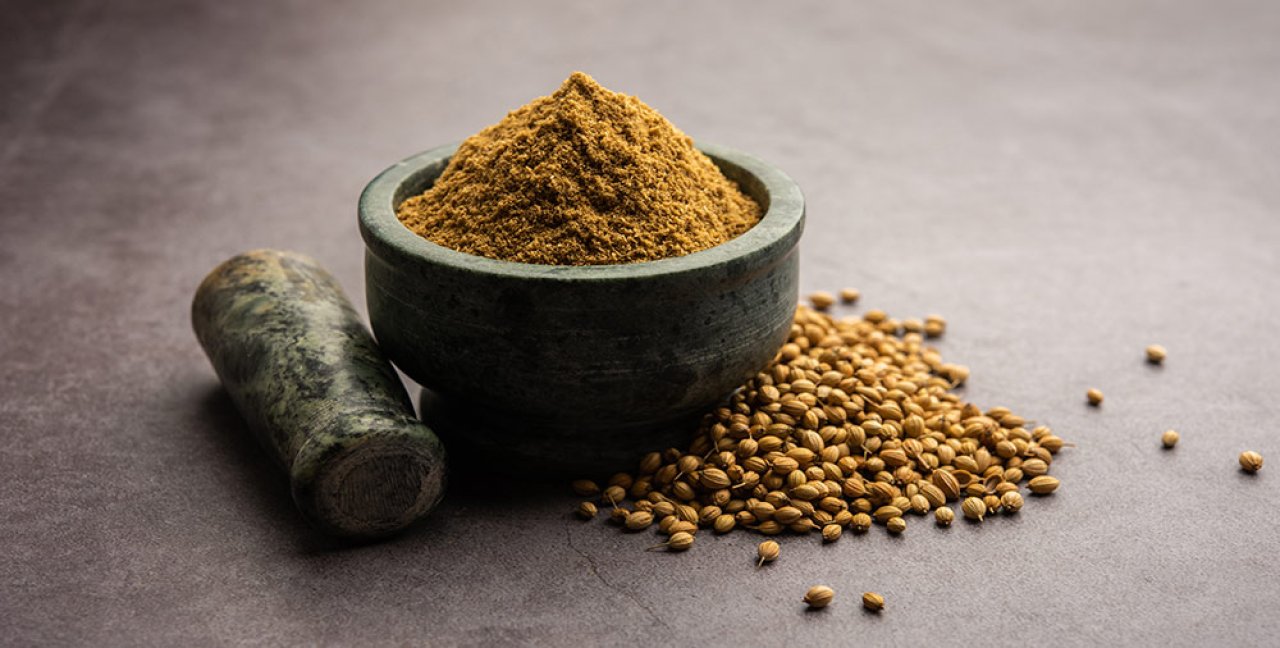
What is coriander ?
Coriander, also known as dhania in some countries, is a herb frequently used in cooking and traditional medicine. The plant produces both leaves (cilantro) and coriander seeds. Coriander is utilised as a herbal flavouring agent in the manufacture of sauces, salads, chillies, seafood dishes, Mexican salsa, and diverse ethnic meals. All parts of the plant are edible, although the fresh leaves and the dried seeds are the components most commonly used in cooking. Coriander may help decrease your blood sugar, combat infections, and support heart, brain, skin, and digestive health.
Cilantro (Coriander leaves) They have a zesty, somewhat flowery flavor and are typically used as a garnish or added to recipes for their fresh and lively taste. oriander Seeds: The dried seeds of the coriander plant have a toasty, nutty taste with lemony notes. They are often used whole or ground as a spice in cuisine, notably in curries, soups, stews, and spice mixes. Coriander seeds are also a prominent element in pickling spices and are used in making specific varieties of beer.
cilantro and coriander seeds are praised not just for their taste but also for their possible health advantages. They contain different vitamins, minerals, and antioxidants and have been utilized in traditional medicine for their digestive and anti-inflammatory qualities.
Dhania powder is flexible and may be used in both vegetarian and non-vegetarian recipes, including curries, stews, soups, stir-fries, and roasted meats. This spice imparts a toasty, nutty taste with lemony notes to foods. It is widely used as a primary ingredient in spice mixes, curry powders, marinades, and rubs.
Rich in Nutrients
Coriander leaves (cilantro) are an excellent source of vitamins A, C, and K, as well as minerals including potassium, calcium, manganese, and magnesium. Coriander seeds also include these minerals, along with dietary fiber.
Antioxidant Properties
Coriander includes antioxidants such flavonoids, phenolic compounds, and vitamin C, which help neutralize free radicals in the body, potentially decreasing oxidative stress and lowering the risk of chronic illnesses.
Digestive Health
Coriander seeds have long been used to assist digestion. They may help activate enzymes in the digestive system, boost the generation of digestive juices, and alleviate symptoms like bloating and gas.
Anti-Inflammatory Effects
Some research show that coriander may have anti-inflammatory qualities, potentially lowering inflammation in the body and relieving symptoms of inflammatory disorders like arthritis.
Cholesterol Management
Research suggests that coriander seeds may help decrease LDL (bad) cholesterol and triglyceride levels while boosting HDL (good) cholesterol, leading to heart health.
Blood Sugar Control
Coriander seeds include chemicals that may help manage blood sugar levels by raising insulin production and enhancing insulin sensitivity, which might assist those with diabetes or those at risk of acquiring the illness.
Antibacterial and Antifungal
Coriander has been demonstrated to exhibit antibacterial and antifungal properties, which may help fight infections and boost general immune function.
Skin Health
Some individuals use coriander topically for skin issues like acne or eczema owing to its anti-inflammatory and antibacterial characteristics.
Medical use
Digestive Aid
Coriander seeds have long been used to help digestive difficulties such as indigestion, bloating, gas, and stomach cramps. They may help stimulate the synthesis of digestive enzymes, promote healthy bowel motions, and calm the digestive system.
Headaches
dhaniya leaves helps to reduce headaches. Spread a paste of dhania leaves on the forehead for a period of ten minutes.
Cholesterol Management
Studies show that coriander seeds may have cholesterol-lowering benefits, perhaps reducing LDL (bad) cholesterol and triglyceride levels while boosting HDL (good) cholesterol. This might help to better heart health and minimize the risk of cardiovascular illnesses.
Mouth ulcers
Coriander includes some chemicals that may have minor analgesic (pain-relieving) effects. Applying coriander paste or oil to the ulcer might help decrease pain and suffering. Apply juice of coriander leaves over the ulcers or keep the fluid in the mouth for 5 minutes
Manage diabetes
Maintaining a healthy weight is vital for managing diabetes. Coriander seeds have been proposed to offer possible weight-reducing benefits, which might benefit patients with diabetes by helping to regulate blood sugar levels and increase insulin sensitivity.
Acne
Mix coriander juice, dhaniya powder, and rose water to produce a paste, apply to the face, and use to reduce acne, pimples, and blackheads.


